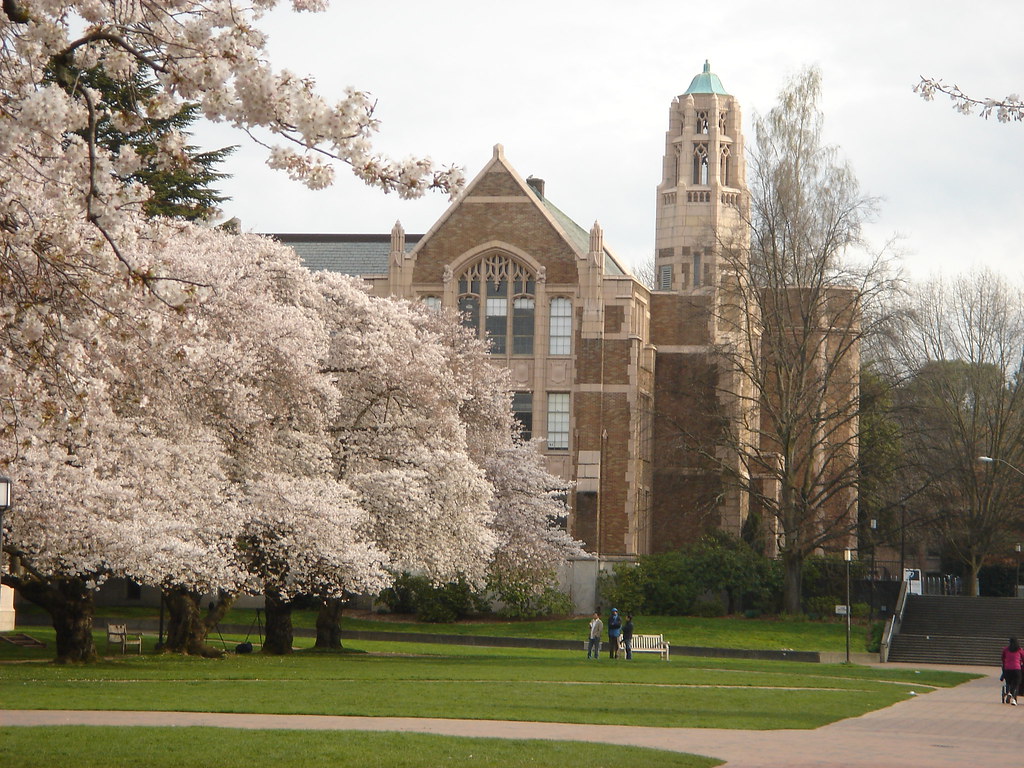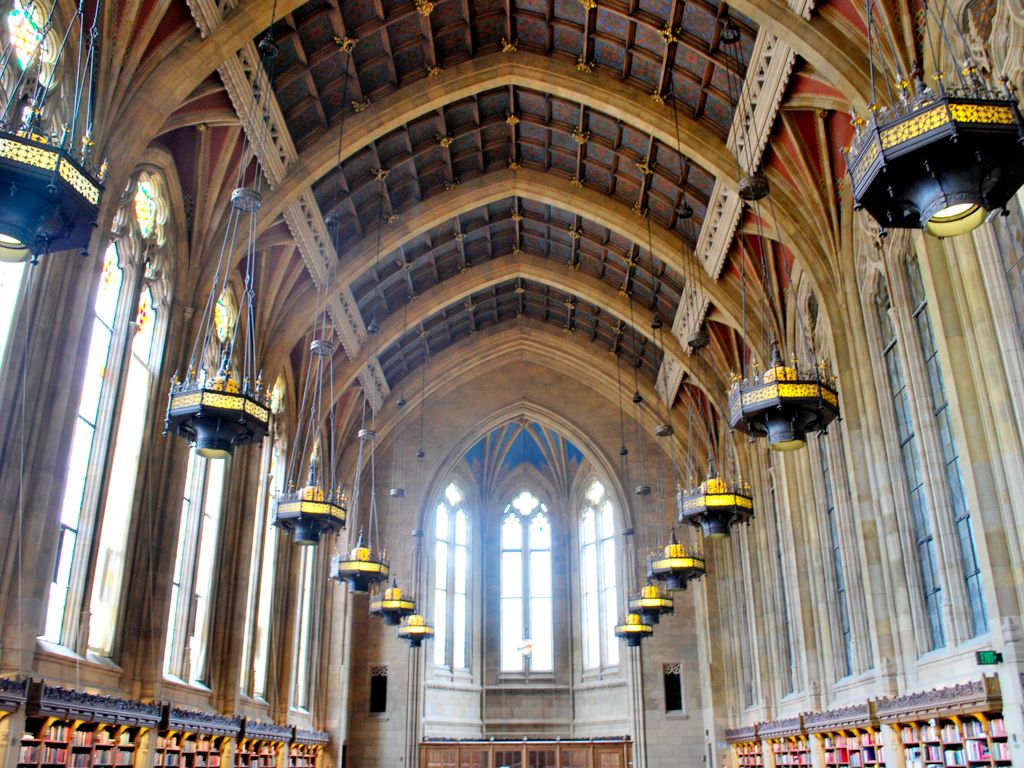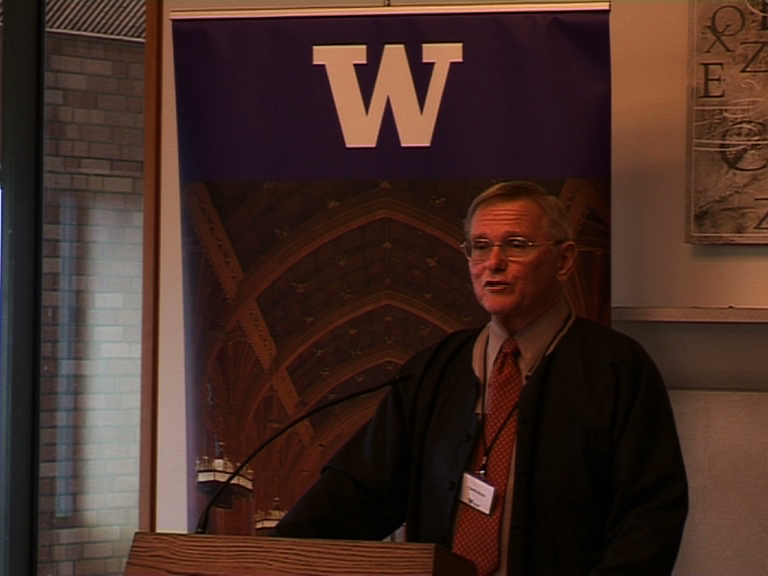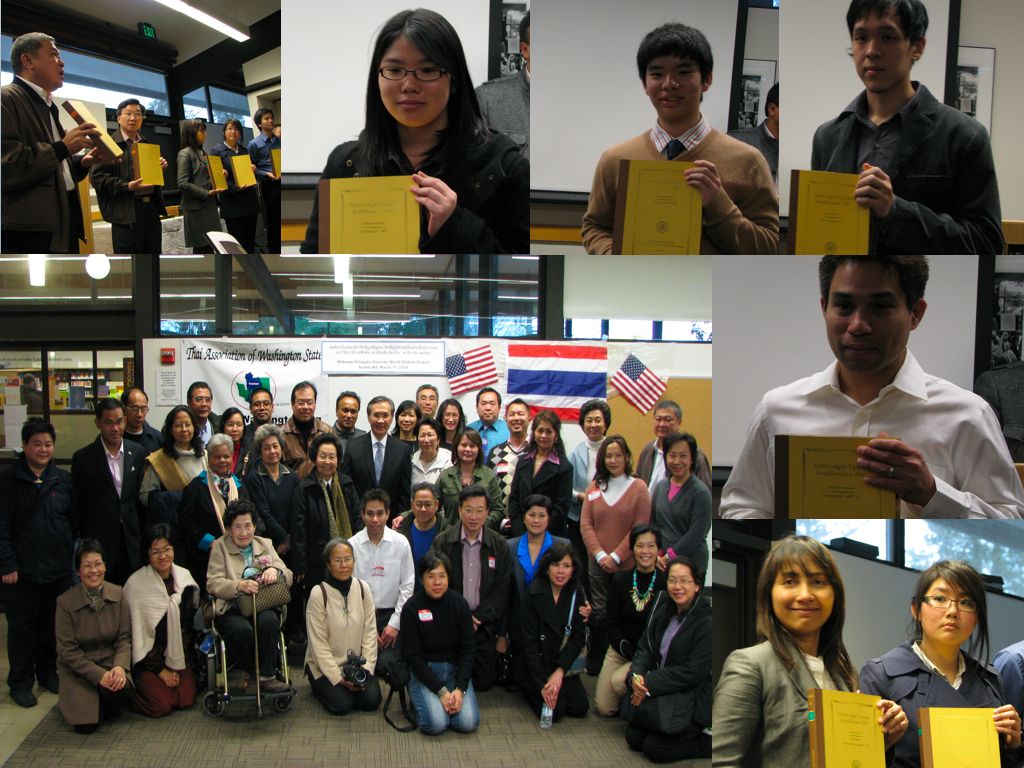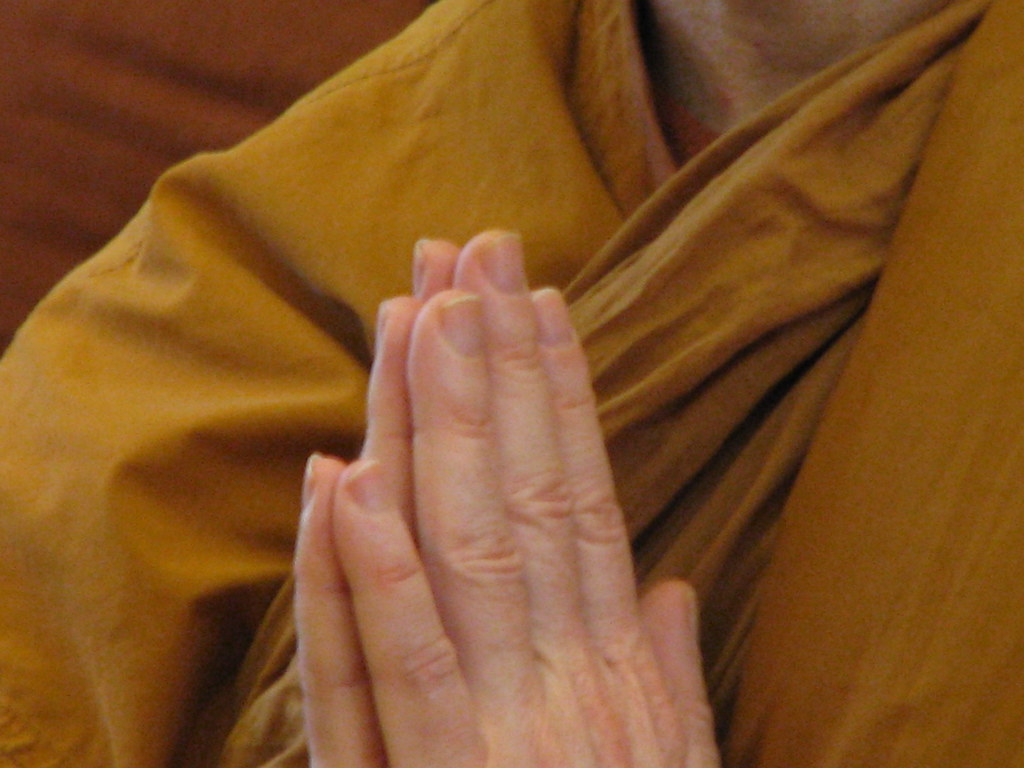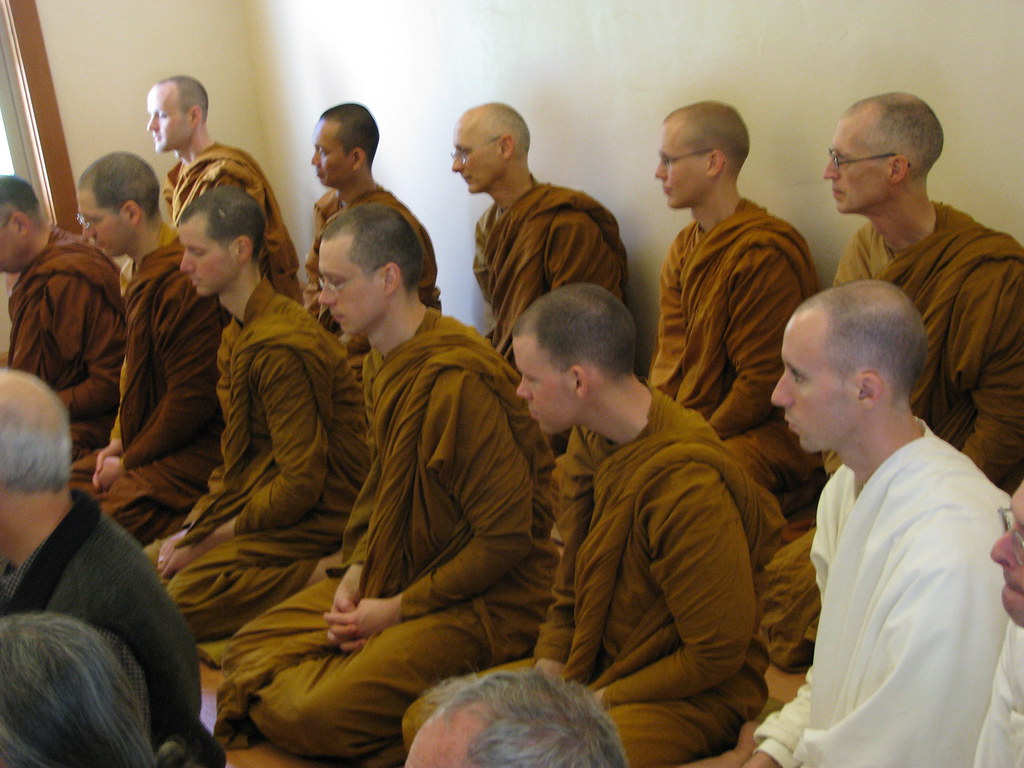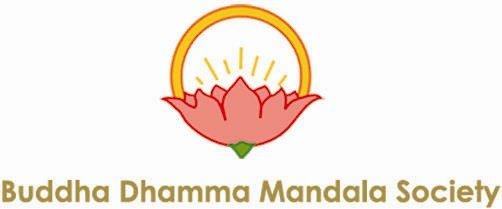Thursday, October 21, 2010
Friday, October 15, 2010
Chulachomklao of Siam Tipiṭaka
Chulachomklao of Siam Tipiṭaka 1893 :
Digital Preservation Edition 2010
Friday, June 25, 2010
Amaro Bhikkhu Interview
A documentary archive for Tipitaka Studies, produced by Dhamma Society's the World Tipitaka Project 1999-present
Friday, June 4, 2010
Royal Institute & World Tipitaka in USA
Royal Institute & World Tipitaka in USA
A Presentation Video Archives to be premiere on June 9th 2010 for the Fellow Council of the Royal Institute in Bangkok.
จดหมายเหตุโครงการพระไตรปิฎกสากลในสมเด็จกรมหลวงนราธิวาสราชนครินทร์
บันทึกกิจกรรมของราชบัณฑิตยและผู้เชี่ยวชาญจากราชบัณฑิตยสถาน ในพิธีมอบพระไตรปิฎกสากลเป็นพระธัมมทานแก่มหาวิทยาลัยวอชิงตัน สหรัฐอเมริกา
วิดีทัศนี้เป็นส่วนหนึึ่งของจดหมายเหตุประไตรปิฎกสากลอักษรโรมัน ตามรอย พระไตรปิฎก จปร. อักษรสยาม ซึ่งพระบาทสมเด็จพระจุลจอมเกล้าเจ้าอยู่หัว ได้พระราชทานแก่สถาบันสำคัญนานาชาติไม่น้อยกว่า 30 ประเทศทั่วโลก
โครงการ พระไตรปิฎกสากล ดำเนินงานตรวจทาน และจัดพิมพ์เป็นพระธัมมทาน โดยกองทุนสนทนาธัมม์นำสุข ท่านผู้หญิง ม.ล. มณีรัตน์ บุนนาค ในพระสังฆราชปถัมภ์ สมเด็จพระญาณสังวร สมเด็จพระสังฆราช พ.ศ. 2542-ปัจจุบัน
University of Washington Libraries in Seattle, USA.
University of Washington Libraries in Seattle, USA.
Documentary Archives from the inaugural presentation of the World Tipiṭaka in Roman Script to University of Washington Libraries in Seattle, USA.
On this occasion, Fellow of the Royal Institute, also presented the Anthology of Tipiṭaka Studies Reference (1 volume) to the Library.
The World Tipiṭaka in Roman Script was published by the Dhamma Society Fund and the World Tipiṭaka Project as a royal gift of Wisdom & Peace to the world.
Digital Archives from Dhamma Society Fund's World Tipiṭaka Project, 1999-present
สมาคม นักเรียนเก่ามหาวิทยาลัยวอชิงตัน ร่วมกับกองทุนสนทนาธัมม์นำสุขฯ ได้อัญเชิญพระไตรปิฎกสากล อักษรโรมัน ชุด 40 เล่ม ไปมอบเป็นพระธัมมทานในสมเด็จกรมหลวงนราธิวาสราชนครินทร์ แก่หอสมุดมหาวิทยาลัยวอชิงตัน วันที่ 8 มีนาคม 2553 ซึ่งเป็นสถาบันแรกที่ได้รับมอบในสหรัฐอเมริกา
ในการนี้ มหาวิทยาลัยวอชิงตันได้เชิญผู้แทนจากราชบัณฑิตยสถานไปร่วมพิธีด้วย
ศ. ดร. ปัญญา บริสุทธิ์ นายกราชบัณฑิตยสถาน จึงได้มอบหมายให้ ศ.ดร. เปี่ยมศักดิ์ เมนะเศวต อุปนายกราชบัณฑิตยสถาน คนที่ 1, ให้เป็นผู้แทนราชบัญฑิตยสถานไปมอบ "ปทานุกรมพระไตรปิฎกศึกษาอ้างอิง" ฉบับประมวลเนื้อหา 1 เล่ม ซึ่งจัดพิมพ์โดยกองทุนสนทนาธัมม์นำสุขฯ แก่หอสมุดด้วย ในฐานะที่ผู้เชี่ยวชาญต่างๆ จากราชบัณฑิตยสถาน ได้ให้คำปรึกษาด้านวิชาการแก่โครงการพระไตรปิฎกสากล มาตั้งแต่ พ.ศ. 2542 เป็นต้นมา
ตอนจบสารคดี ศ. วิสุทธิ์ บุษยกุล ราชบัณฑิต ได้เป็นผู้แปลและอ่านสังวัธยายพระไตรปิฎกสากล ภาคแปลเป็นภาษาอังกฤษ "ศีล & ปัญญา เป็นยอดในโลก"
จดหมายเหตุโดย กองทุนสนทนาธัมมนำสุข ท่านผู้หญิง ม.ล. มณีรัตน์ บุนนาค ในพระสังฆราชูปถัมภ์ พ.ศ. 2542-ปัจจุบัน
Thursday, May 27, 2010
Visākha Pūjā
Is one of the most important days in Buddhism
Because of three important incidents in the life of The Buddha;
The Day of Visak, formally entitled as the Historical and Timeless Significance, is a Tipiṭaka Multimedia, produced by the Dhamma Society for the inauguration of the International Tipiṭaka Hall Vasaka Celebration in 2003.
Pāḷi Recitation and translations in Thai and English by Master Siri Petchai and Prof Visudh Busyakul. Included are also passages from Pāḷi Tipiṭaka and translations in Sinhalese, German, French, and English. Dhamma Society wishes to thank all individual participants in this production.
This documentary was produced and edited by volunteers of the World Tipiṭaka Project
Pāḷi Tipiṭaka Offering
by Ajahn Amaro
On November 24th 2009, Ajahn Pasanno, Abbot of Abhayagīrī, was invited to attend a celebration ceremony at the Temple of the Emerald Buddha, in Bangkok. The sponsoring organization, The World Tipiṭaka Project in Roman Script, had also invited members of the Sangha from Burma – including monks who could recite either two or all three of the divisions of the Pāḷi Canon – as well as senior monks from the Theravādan regions of Yunnan, in mainland China.
The principal aim of this private organisation is to provide the world with a reliable edition of the Pāḷi Canon in Roman script. To that end they have spent ten years poring over extant editions. These include the text agreed upon by the Sixth Great International Council, held in Burma over the year 2500 of the Buddhist era (1956-57), the edition produced by the Pāḷi Text Society, as well as that of S.N. Goenka’s students, and several others. Through meticulous checking and cross-checking they managed to find and correct literally hundreds of thousands of typographical and other errors. Their efforts have born fruit in what can certainly be reckoned as the most trustworthy representation of the Word of the Buddha, in the Roman alphabet.




The ceremony in Bangkok was an occasion of commitment; the group has undertaken to offer these sets of 40 volumes to various universities and monasteries worldwide, many of them going to the very same institutions that were given similar sets in 1897, but in Siam (Thai) script, by King Chulalonkhorn Chulachomklao of Siam. Last year’s ceremony was presided over by HRH Princess Chulabhorn – the youngest daughter of the current King and Queen of Thailand – and was also an occasion to dedicate the blessings of the offering to the His Holiness, Somdet Phra Ñāṇasaṃvara, the Supreme Patriarch of Thailand, on his 96th birthday.

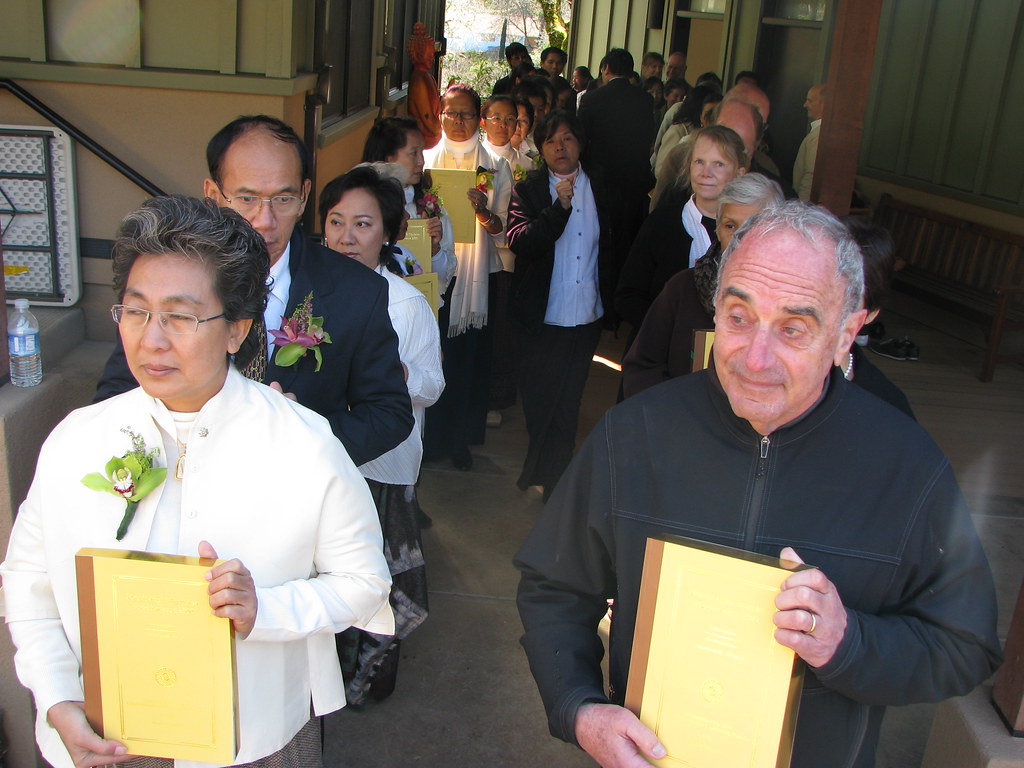


On March the 13th 2010, Abhayagīrī Monastery was honoured to receive a delegation of twenty people from The World Tipiṭaka Project, headed by the Project’s founder and primary organizer, Maj. Bunnag, and M.L. Anong Ninubon, who also celebrated her 93rd birthday that very day. The group had come to make a presentation of sets of the Tipiṭaka to The University of Washington, Seattle, as well as to Abhayagīrī. In addition they came to visit The University of California, Berkeley, particularly to view the edition of the Chulachomklao of Siam Pāḷi Tipiṭaka that had been given to that university in 1897.
As this was an auspicious and unique event many of the long-standing friends and supporters of Abhayagīrī gathered for the occasion, even though it was in the usually quiet time of the winter retreat. Many of our regular visitors also stowed their customary wardrobe of jeans and t-shirts for the day with everyone making impressive efforts to deck themselves in suitably festive attire. As befitted the occasion, the hall was also festooned with an abundance of flowers; delicate bouquets and effulgent sprays garlanded the newly-offered volumes.



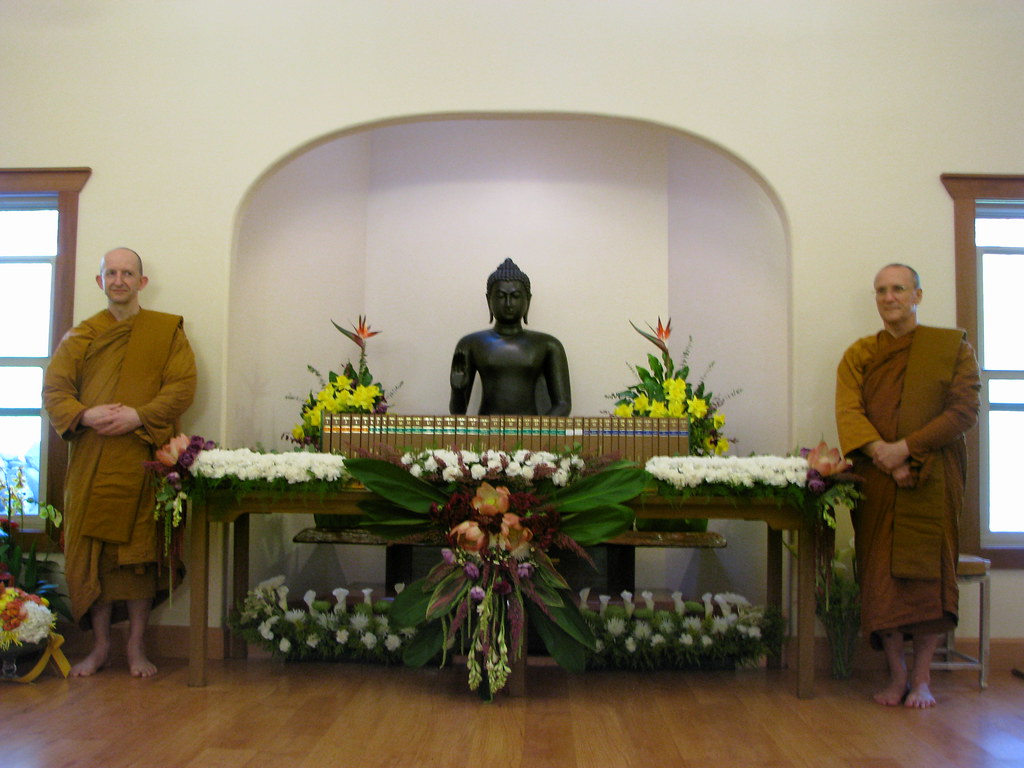
The visitors began the event by showing a presentation about their project and, when all of the procedures of the presentation were complete, and reflections on the occasion had been offered, the event was closed by reciting the Buddha's first teaching – Dhammacakkappavattanasutta : The Discourse on Setting in Motion the Wheel of Dhamma – and a communal Sharing of Blessings.
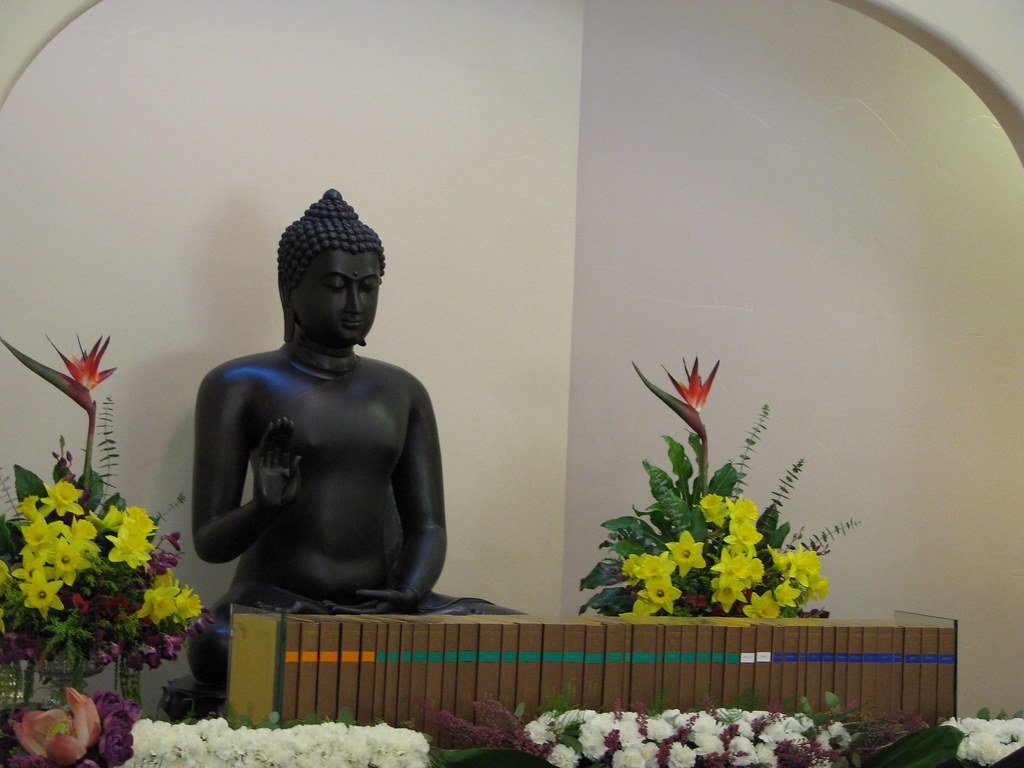


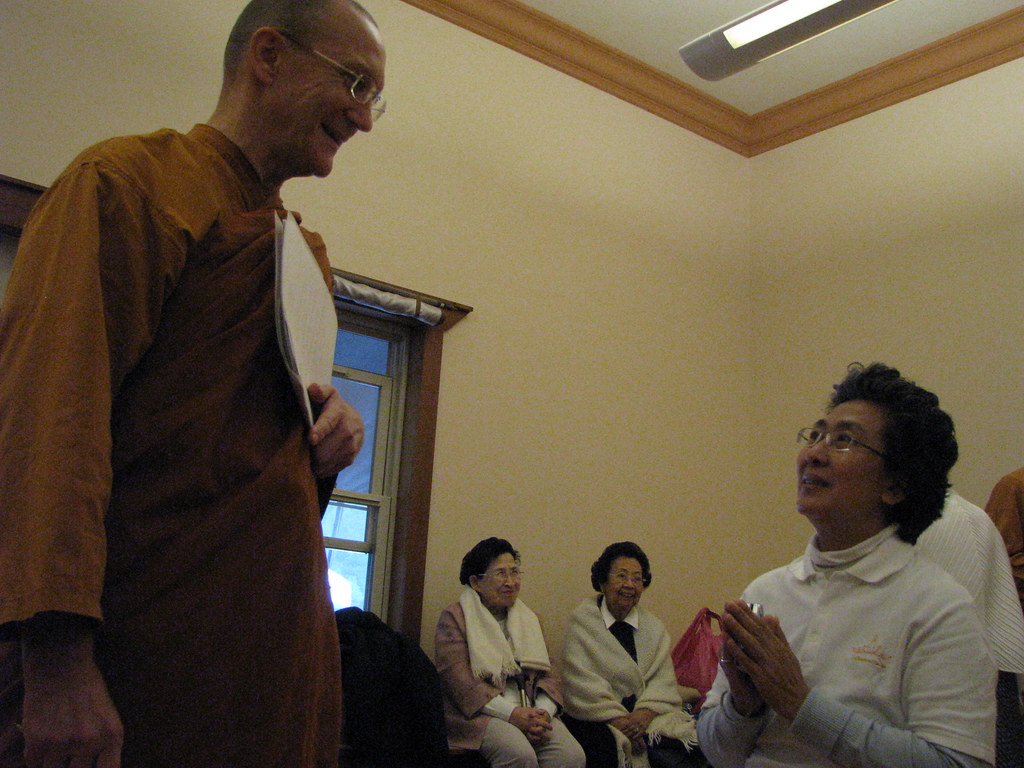
It is in the spirit of sharing blessings that this energetic and generous group have put forth the Herculean effort required to create this World Edition of the Pāḷi Canon. They see that these teachings are part of the world’s heritage of knowledge and have undertaken this endeavour in order to enable all those who wish to partake of that knowledge to be able to access it freely.
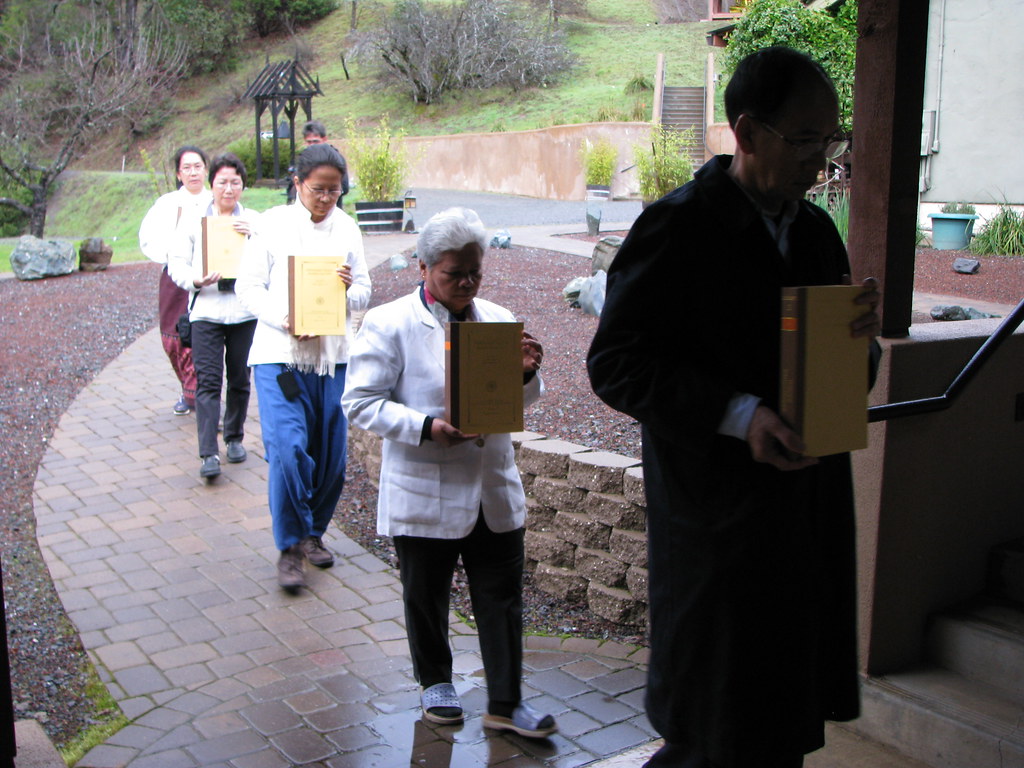
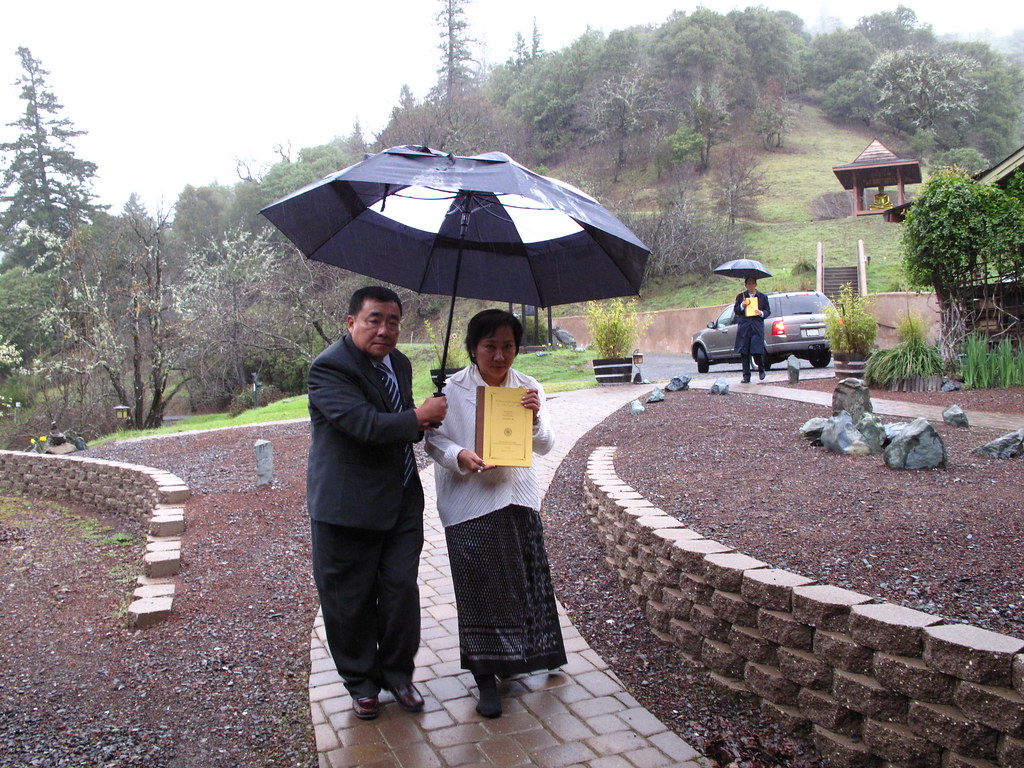

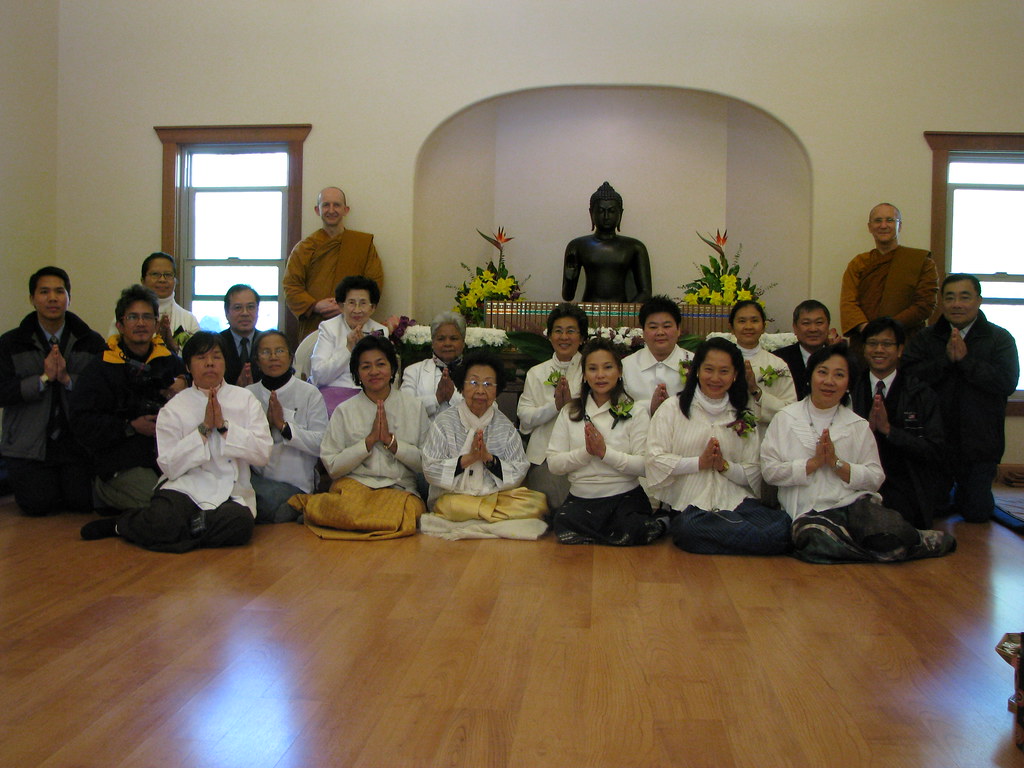
May the books that they have offered to this one small monastery serve to illuminate the hearts and minds of all who reside here, and thus help to illuminate the lives of all those with whom we are connected.
Thursday, May 13, 2010
World Tipiṭaka for Malaysia & Singapore 2010
World Tipiṭaka Presentation for Malaysia & Singapore
7 May B.E. 2553 (2010)
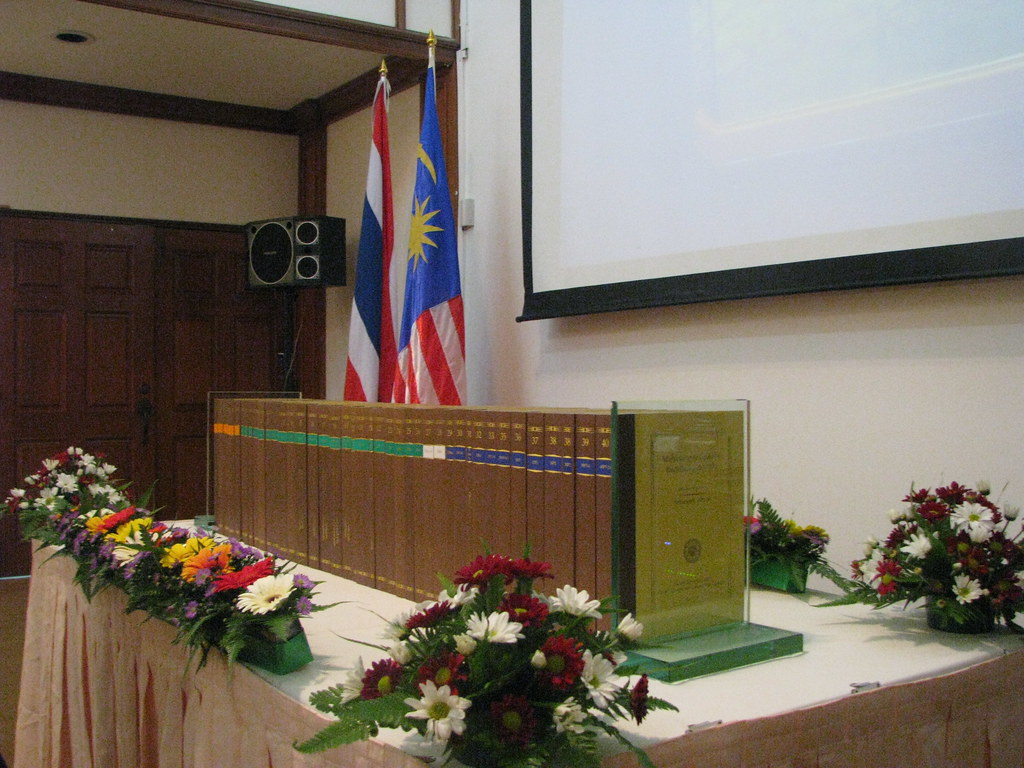 | 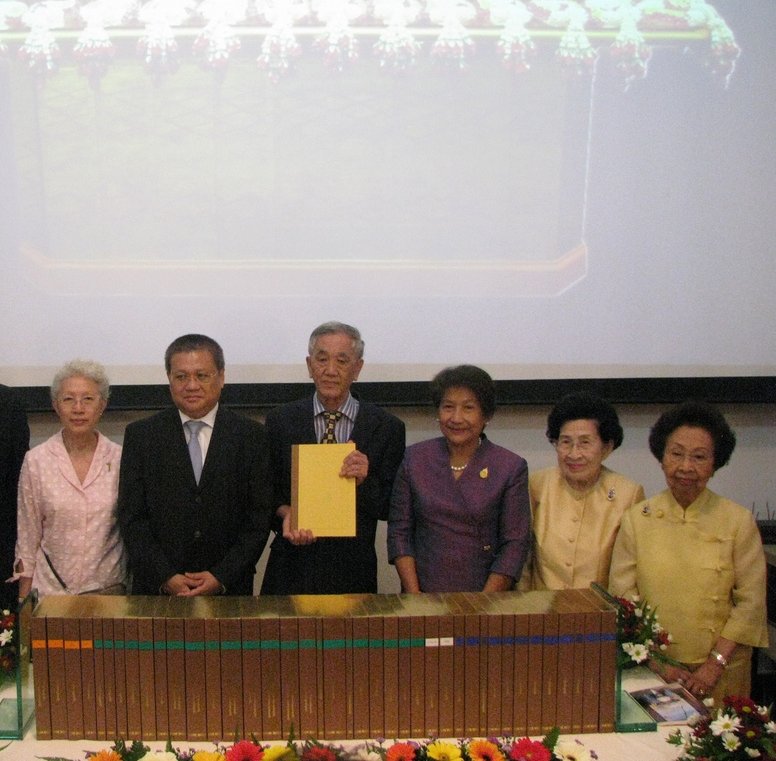 | 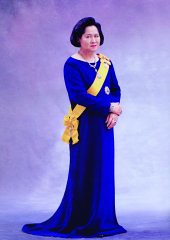 |
by John Soh,
Honorable Ladies M.L. Anong and Vichandra
Patrons of the World Tipiṭaka, Ladies and Gentlemen :
The Pāḷi Tipiṭaka is for we Buddhists the font of our religion. It is where we get our ethics, our world view and our philosophy from. Each Buddhist Culture reads the Tipiṭaka in their own language or at least in their own script. But with Buddhism now spreading to the West there is a need for an accurate and reliable edition of the Tipiṭaka in Roman script.
Of course the Tipiṭaka has been published in Roman script before but all these editions have various errors or drawbacks. For example, I was looking at the first volume of Fausboll's edition of the Jataka published in 1877 by the Pali Text Society and noticed that it has four pages of corrections and additions and that when this volume was reprinted in 2000 these corrections and additions had still not been included in the text.
This is not to disparage the dedication and hard work of earlier scholars but merely to point out that there is still room for improvements. And this edition in Roman script definitely is an improvement. Indeed it is a work of the highest order and a truly magnificent monument to Her Royal Highness Princess Galyani Vadhana in whose memory this gift is made to our and other societies and institutions, and to Mrs. Maniratana Bunnag, the founder of the World Tipiṭaka Project. In preparing this new edition advanced computer-controlling procedures have been used in several dimensions to ensure complete accuracy such as, double-cross checking, from the revision stage through to the artwork, layout and printing.
Most importantly, in the World Tipiṭaka Edition, the Pāḷi text with special diacritical marks has been printed by using an open-standard typeface which is user-friendly and easy to copy into any electronic format for references. I noticed also that the layout, design, binding and paper used in each volume are all of the highest quality. This new edition of the Tipiṭaka is not just a major achievement from the point of view of Buddhist scholarship,it is also aesthetically pleasing, which is only appropriate for an edition of the sacred scriptures.
In our society it will be treasured and used. On behalf of the
May 7, 2010
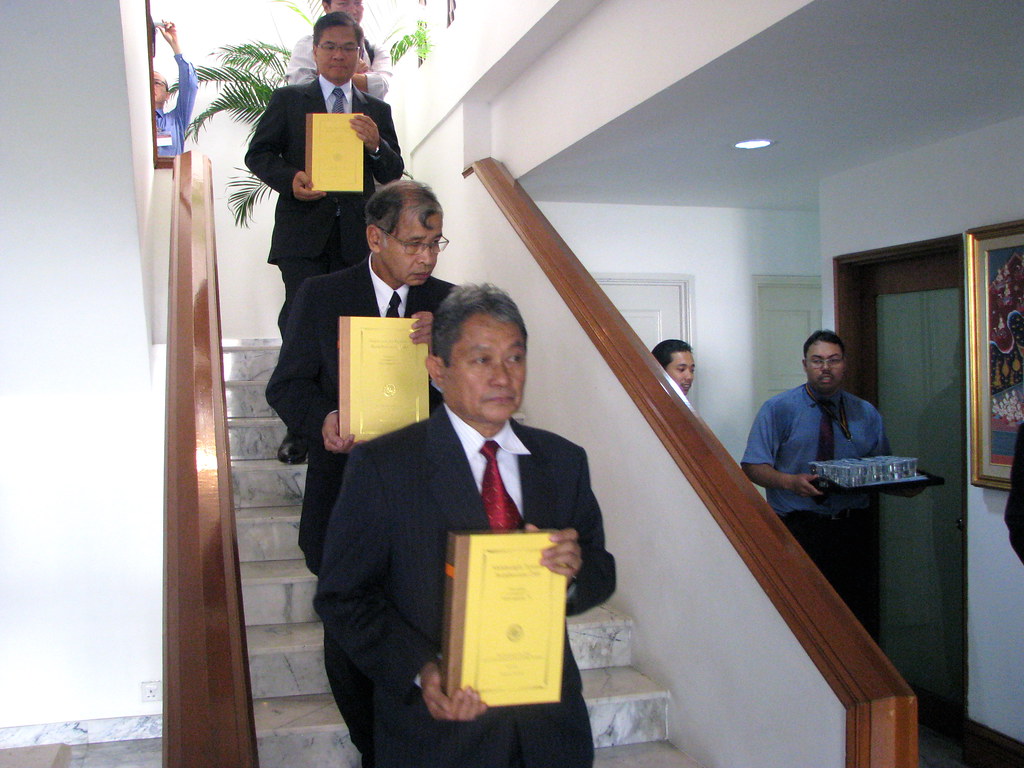
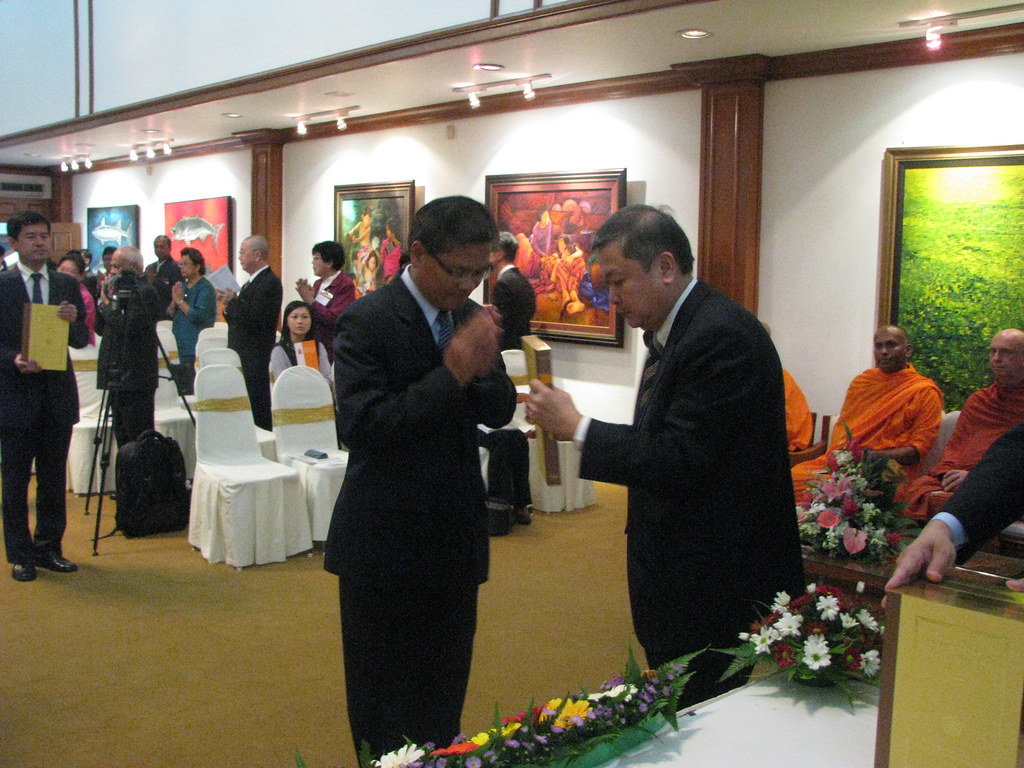
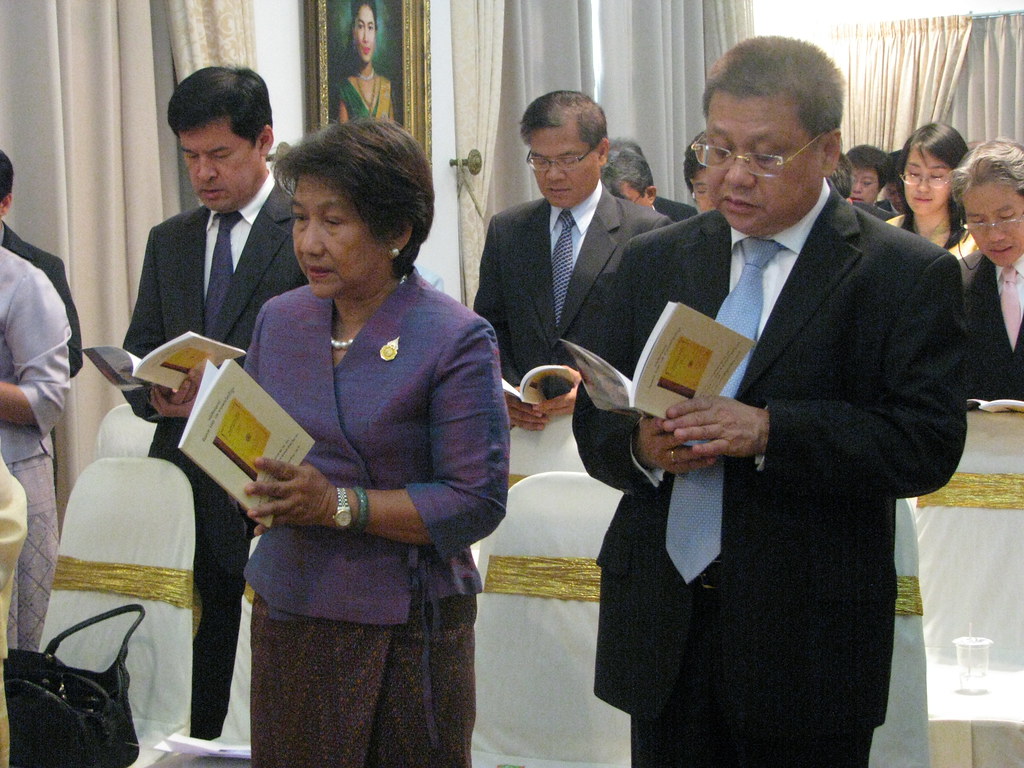
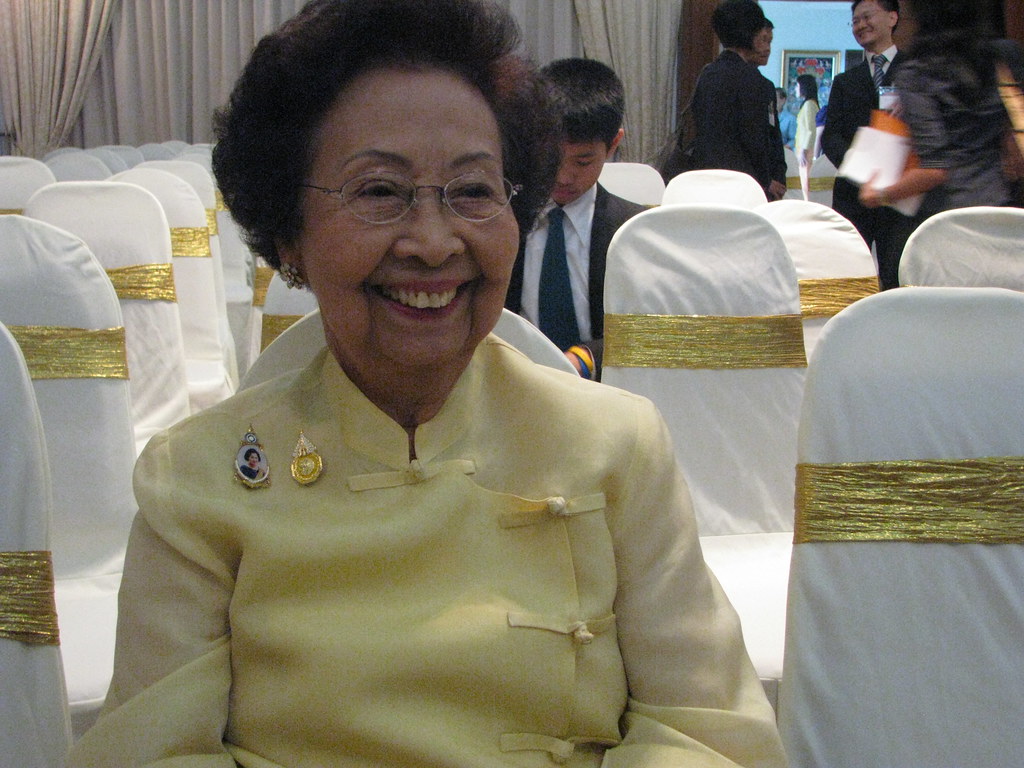
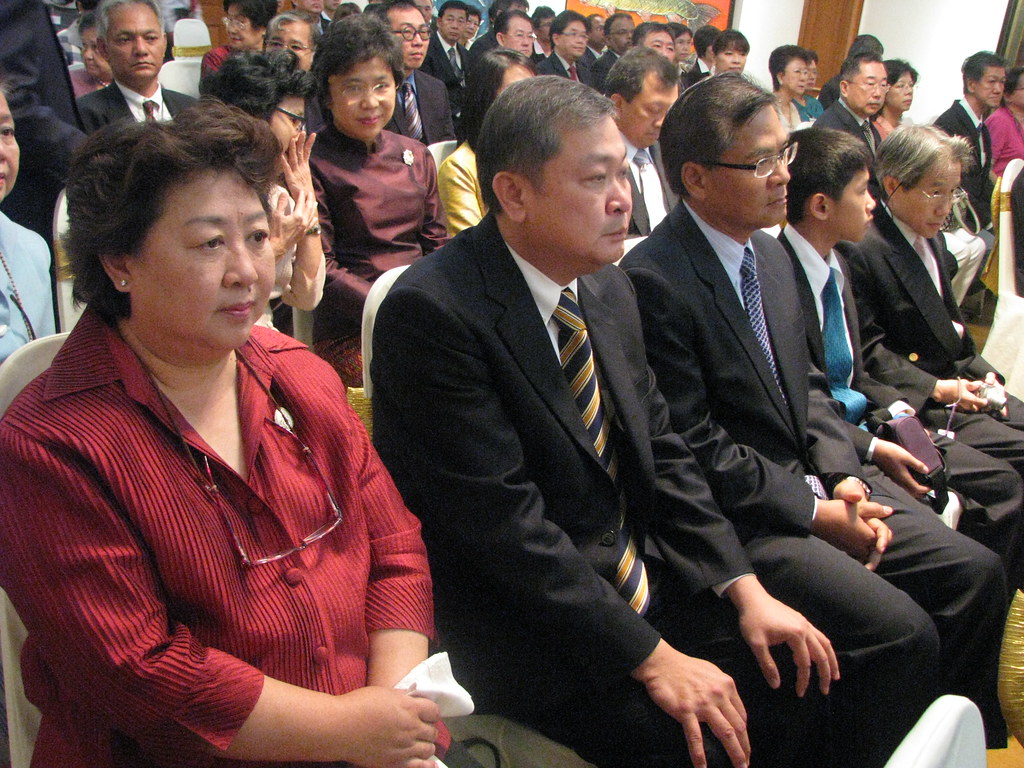
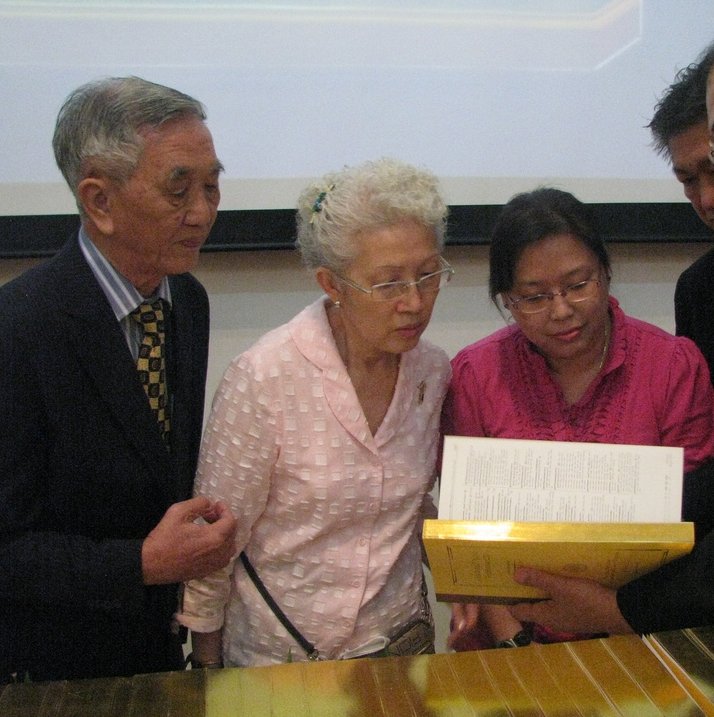
Tuesday, April 27, 2010
Univ of Washington Tipitaka Procession for Wisdom & Peace
Members of various organisations from Thailand and USA are seen participating in the Tipitaka Procession to specially transport the 40-volume royal gift of the World Tipitaka in Roman Script to the ceremony hall on the forth floor of the Suzzlo Library Complex. The World Tipitaka was published by the Dhamma Society in 2005 and has has been presented for the first time in the US to the University of Washington Libraries in Seattle. The special presentation is a prelude to the forthcoming World Tipitaka Presentation to leading institutions in USA following the royal gift of Tipitaka in Siam-Script Edition from King Chulalongkorn Chulachomklao of Siam in 1893.
The Tipitaka, orally transmitted in Pali language of Indo-Arayan origin, is the sacred text of the Buddha's words which have been preserved well intact through Great Councils for over 2500 years. This is the first time that the Great International Council Manuscript "the World Edition B.E. 2500/1957" has been published in Roman script (International Phonetic Albhabet Pali, IPA Pali) in the standard 40 volumes together with support from the World Tipitaka WebService Database.
This special digitial edition "the Open-Source WebService 2010" was published by Dhamma Society's World Tipitaka Project with support from the Energy Regulatory Commission of Thailand and was presented as a royal gift of Wisdom & Peace in collaboration of the University of Washington Alumni Association of Thailand on March 8, 2010 at the Suzzlo Library, Seattle, Washington State, USA.
The Gift of Dhamma Excels all other Gifts !
การอัญเชิญพระไตรปิฎกสากล เพื่อมอบเป็นพระธัมมทานในสมเด็จกรมหลวงนราธิวาสราชนครินทร์ แก่มหาวิทยาลัยวอชิงตัน นครซีแอ็ตเทิล สหรัฐอเมริกา พ.ศ. 2553
พระไตรปิฎกสากลอักษรโรมัน จัดพิมพ์เป็นพระธัมมทานโดย กองทุนสนทนาธัมม์นำสุขในพระสังฆราชูปถัมภ์ฯและมอบแก่สถาบันสำคัญ ตามรอยพระไตรปิฎก จปร. อักษรสยาม ร.ศ.112/พ.ศ.2436
จดหมายเหตุ สารคดีพระไตรปิฎก โดย โครงการพระไตรปิฎกสากล ดำเนินงานโดยกองทุนสนทนาธัมม์นำสุข ท่านผู้หญิง ม.ล. มณีรัตน์ บุนนาค ในพระสังฆราชูปถัมภ์ สมเด็จพระญาณสังวร สมเด็จพระสังฆราช สกลมหาสังฆปริณายก พ.ศ. 2542-ปัจจุบัน
Wednesday, March 31, 2010
Univeristy of Washington Received the World Tipitaka Edition 2010
Keynote Speech
by
Professor Keyes
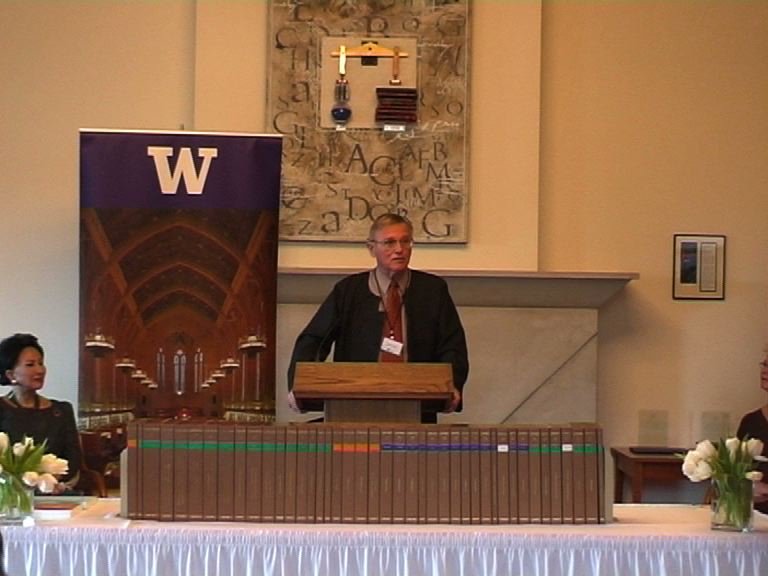
Mr. Suradhaj (สุรธัช), and all members of the Thai delegation
It is a great honor that you have come to the University of Washington to present the World Tipiṭaka to our Libraries.
Although the link between the University and Thailand may not date back to 1895, it does have a long and significant history.
2010 is the hundredth anniversary of Asian Studies at the University, a field that today is under the auspices of the Jackson School of International Studies and the Department of Asian Languages and Literature.
Thai language was first taught at the University of Washington in the 1950s under the direction of Professor Li Fang-kuei, a distinguished linguist who specialized on languages in China and Southeast Asia. The University of Washington has offered Thai instruction ever since, and is one of a handful of universities in America to have such a long record of Thai language instruction. We are fortunate to have Dr. Wiworn Kesavatana-Dohrs continuing this role.
In the 1950s Thai students began to come to the University of Washington from Thailand for the first time. Among the first Thai to receive PhDs here were Dr. Deb Menasveta (เทพเมนะเศวต) in fisheries and Dr. Sanga Sabhsri in forestry, both of whom went on to have very distinguished careers. I know that the late Dr. Sanga would have been very pleased with this event today as he was a devout Buddhist and we are delighted that Dr. Deb is represented here today by Dr. Piamsak, his son.
I personally decided to join the faculty of the University in 1965 because I felt confident that given the commitment to instruction in Thai and in Asian studies more generally as well as the attraction of Thai students to the university that this would be an excellent place to promote Thai studies. There have been a few ups and downs from time to time, but my early faith has clearly been realized.
During my long tenure at the University, I have been very fortunate to recruit, find support for and see through to completion of their PhD programs almost a dozen students from Thailand. Ajarn Amara Pongsapich, the director of the Thai Human Rights Commission and former dean of the Faculty of Political Science at Chulalongkorn University who is here today, was the first and most distinguished of this group. These luksit are the legacy of which I am most proud.
When I first came to the University I found that the Libraries already had an embryonic collection of Western language materials on Thailand. I soon realized that the Libraries staff were very receptive to building a collection in Thai language materials as well as in other languages about Thailand. In each of the extended research trips I made to Thailand from the 1960s through the 1990s, I collected many works in Thai, most of which are now in the Libraries collection.
As the founding director of Southeast Asian studies at the University, I recognized that the development of collections on Southeast Asia, including Thailand, would be greatly enhanced if there were a position at the Libraries dedicated to this goal. We were fortunate first in receiving funding from the Luce Foundation for such a position and then even more fortunate in recruiting Dr. Judith Henchy, who has organized this event, to fill it.
Judith has recently secured funding from the US Department of Education for a project joint with the Maha Chakri Princess Sirindhon Center and Mahidol University’s Institute for Population and Social Research to develop a virtual archive, searchable in both Thai and English, of research materials on Thailand. Thus, the University of Washington Libraries is contributing to the development of Thai studies not only here, but also in Thailand itself.
I see the presentation of the collection of the World Tipiṭaka here today not only as an honor for the University of Washington Libraries, but as the capstone of UW’s long connection with Thailand. ขอบคุณมากฯ ครับ
